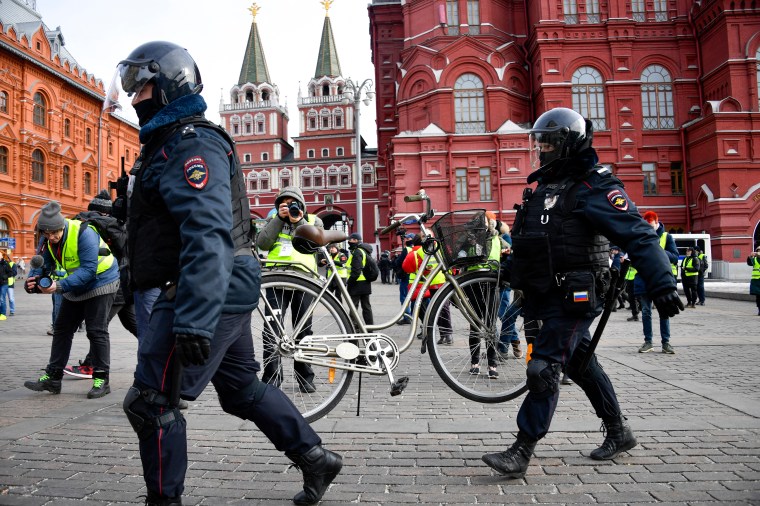Paris, March 25, 2022 – Russian authorities should stop harassing journalists from the independent news website Sota.Vision, and allow all members of the press to work freely, the Committee to Protect Journalists said Friday.
Since March 7, authorities have detained at least seven journalists with Sota.Vision, including two who were sentenced to multiple days in prison, and also fined and harassed employees of the outlet, according to media reports and Sota.Vision editor Aleksey Obukhov, who spoke to CPJ via messaging app.
“Russian authorities must stop their repeated harassment and detentions of journalists with Sota.Vision and other independent outlets,” said Gulnoza Said, CPJ’s Europe and Central Asia program coordinator, in New York. “With independent Russian journalists fleeing abroad in droves to avoid being jailed for factual reporting on the war against Ukraine, the few that remain must be allowed to provide crucial information to the Russian people.”
On March 7, authorities fined Sota.Vision correspondent Gleb Sokolov 20,000 rubles (US$200) for allegedly violating the establishes procedure for rallies after he covered an anti-war protest in Moscow on February 25, the outlet wrote on its Telegram channel.
On March 17, law enforcement searched the home of Sota.Vision journalist Elena Izotova in the southwest city of Kazan and seized her technical equipment, according to Sota.Vision and Obukhov, who said that authorities have labeled her as a witness to an investigation into incitement to mass disorder, which he believed was a pretext to harass her.
On March 18, authorities detained Sota.Vision journalists Pavel Ivanov, Ruslan Terekhov, Artyom Kriger, Nika Samusik, and Aleksandr Filippov in Moscow and St. Petersburg ahead of planned rallies in those cities supporting the Russian military, according to news reports and Obukhov.
Kriger, Samusik, and Filippov were released later that day without charge, and Ivanov and Terekhov were charged and convicted of disobeying authorities, according to those sources, which said that Ivanov was sentenced to three days of administrative detention and Terekhov to 10 days.
The Second Special Regiment, a special police unit designed to disperse rallies, alleged that Terekhov refused to show his camera cases for inspection to determine whether they contained explosives, according to Sota.Vision, which said he had appealed the conviction.
On March 19, a police officer visited the home of Sota.Vision journalist Pyotr Ivanov in St. Petersburg in connection with the journalist’s detention at an unsanctioned rally on March 6, according to his outlet and Obukhov.
“The visit was most likely an attempt to intimidate him” before he covered an anti-war rally, Obukhov told CPJ, saying that such a visit “makes you understand that you are ‘on the hook’ and will be detained if you show up at the rally, despite your press card, editorial assignment, [press] vest, and so on.”
On March 23, Russian Investigative Committee operatives searched the home of Sota.Vision editor Darya Poryadina in the northwestern city of Arkhangelsk, according to multiple posts on Sota.Vision’s Telegram channel and media reports.
After the search, authorities held Poryadina for more than 12 hours at the Investigative Committee’s Arkhangelsk office, and released her after she signed a non-disclosure agreement, according to those reports.
During her detention, authorities interrogated Poryadina as a witness in a criminal case over opposition leader Alexei Navalny’s creation of an alleged “extremist community,” according to those reports. During the search, authorities seized her equipment and press card, as well as about 100,000 rubles in savings, according to Obukhov.
“Darya had never been affiliated with any of Navalny’s organizations, but had covered protests in Arkhangelsk, including the January 2021 return and arrest of Navalny,” Obukhov said.
And on Friday, March 25, police briefly detained Sota.Vision freelance contributor Aleksandr Peskov, and released him after designating him as a suspect in an investigation for allegedly insulting law enforcement, according to Sota.Vision and Obukhov. If charged and convicted under Article 319 of the criminal code, he could face a fine of up to 40,000 rubles (US$400) or up to one year of corrective labor.
CPJ was unable to contact the Russian Interior Ministry or Investigative Committee for comment, as their websites did not load.
[Editors’ note: This article has been changed in its second and eleventh paragraph to correct Obukhov’s title and fix a typo in the January 2021 date.]
